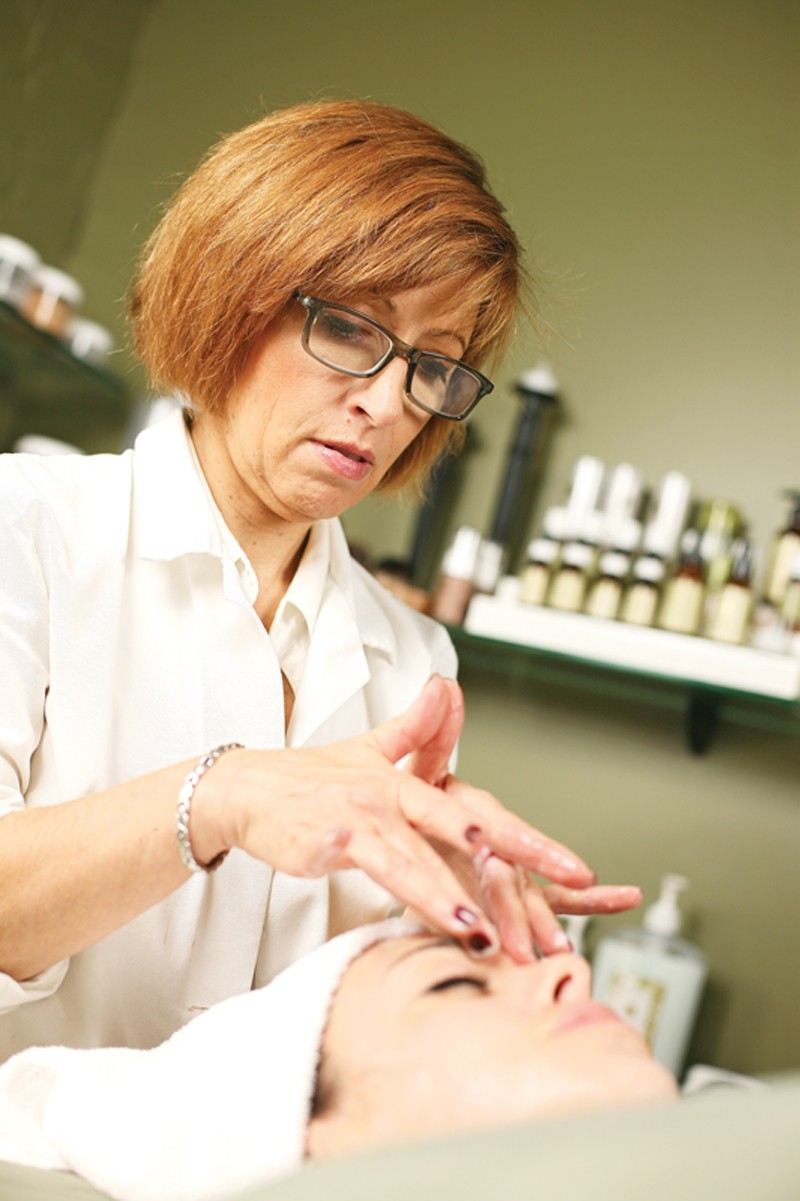If beauty is only skin deep, well, that’s all the more reason to make sure your skin glows. But while we’re obsessing over wrinkles and skin tone, it’s important to keep in mind our skin is actually a functioning body part — in fact, it is our biggest organ. And it’s a vital one.
“The skin’s job is to be a barrier and keep the world out,” says Dr. Katherine Reed of Dermatology Specialists of Spokane.
Unhealthy skin can manifest itself in a number of ways: rashes, inflammation, itching, scaly skin. Some people feel like their skin just has a lackluster tone. Even acne and rosacea — though technically both skin diseases — can sometimes indicate that skin is not properly looked after, Reed says.
GIVE IT A RINSE
“The most important thing to keep your skin healthy is keeping it clean,” says Linda Biel, owner of Urbanna Natural Spa and Salon in Spokane.
Reed recommends cleansing twice a day — in the morning before applying a moisturizer and at night to remove the day’s dirt and dead skin. She says a gentle cleanser is best for most people, but those with oily or acne-prone skin should look for cleansers with salicylic acid or benzoyl peroxide.
Exfoliation can help remove more dead skin than a cleanser alone. It gives skin a brighter tone and allows moisturizer to penetrate better. It can be done with a chemical scrub or mechanically with a product like the Clarisonic. Some cleansers, like those with salicylic acid, include ingredients to exfoliate in addition to cleansing.
“In terms of procedures, facials and microderms are good options for getting that exfoliation all in one shot,” Reed says. “Microderm is a procedure where the esthetician uses a tool to get off that top layer of skin to allow your products to work better and penetrate better as well as to make your skin soft and more radiant.”
There is a whole spectrum of facials, from an extraction facial that opens up clogged acne pores to a hydrating facial that forces in more moisture, to chemical peels that even out pigmentation and can help with acne breakouts.
JUST ADD WATER
“We describe [skin] as almost a brick and mortar,” says Reed. “The skin cells are the bricks, the mortar is a lot of components and hydration that really seals off that barrier to keep the world out.”
So proper hydration is essential for both the look and function of skin. Properly hydrated skin is better able to repair itself and keep out harmful things. But achieving good hydration becomes more difficult when the weather turns cold. “Dry skin is really on the increase during the winter because our fireplaces and heaters are on and they burn up all of the moisture in the air, creating a much drier climate in our homes and office buildings,” Biel says.
Hydrating the skin happens from both inside and outside of the body. Drinking plenty of water helps keep skin hydrated from the inside, while moisturizers provide hydration from the outside and are best applied each morning to protect the skin.
Reed encourages everyone to wear a daily moisturizer with sunscreen in it. Some moisturizers pack a little more technology than others, though.
“The newest trend in moisturizers is a component called ceramide,” Reed says. “It’s a natural fat in all of our skin that helps keep the skin hydrated. As we age, we lose that fat and so moisturizers now are containing it. For example, the biggest brand that’s out there right now is called CeraVe, but all of the companies now are starting use that technology to really put some science behind moisturizers.”
Moisturizers tend to use chemicals like glycerin, hyaluronic acid or propylene glycol that some people have sensitivities to. If you have very sensitive skin, an oil-based product might be less irritating, Reed says.
And even if you have acne-prone skin, moisturizers are not necessarily off-limits. Noncomedogenic or oil-free moisturizers usually work fine, and Biel says regular use of an oil-free moisturizer may actually help reduce the body’s inclination to create excessive oil.
MAKE IT UP
After your skin is prepped, it’s time to add a little pizzazz. Freelance makeup artist Shasta Hankins suggests using a primer after moisturizing to help keep makeup from clogging your pores. She stresses the importance of thorough preparation of the skin. Ultimately, “your makeup only looks as good as your skin,” she says. “I can only do so much with products.”
Newer mineral makeups have gotten lots of publicity, and Reed concedes they do offer some benefits. “They are zinc or titanium based, and I think they’re good for sun protection and they’re good for coverage… They’re crushed mineral so they’re a little bit heavier. They don’t feel heavier, but they cover better, and they don’t cause acne.”
CONSULT A PROFESSIONAL
Like most dermatologists, Reed is particularly concerned about skin cancer, and she says an important aspect of healthy skin is simply knowing your skin. A mole, a growing spot or unhealed wound could signify something more sinister. “It’s important to have that evaluated because we know that if we catch skin cancers early, then the risk for a bad outcome is significantly reduced,” Reed says.
And Reed encourages people to check in occasionally with a dermatologist just for information. She says she sees plenty of people who want to know what products and regimen they should be using based on their skin type. “Even if they don’t really have a current problem,” she says, “understanding skin and learning how to care for skin can really make skin look better.”
TIPS N' TRICKS
Freelance make-up artist Shasta Hankins has worked with all kinds of skin. Here are some of the tips she shares with clients to help them improve their skin:
Avoid washing skin with hot water, especially if you have dry skin; it actually dehydrates the skin.
If you have oily skin, use an oil-free moisturizer on your T-zone (forehead, nose and chin) but a thicker moisturizer on the cheek area because it gets especially dry in the winter.
Press a warm, damp hand towel on your lips to help hydrate and soften.
Wait 10 minutes for moisturizer to absorb before applying make-up, or else it will slide right off.
To help keep your skin clean, wash your pillowcases and cell phones on a regular basis.
In lip balms, avoid lanolin because it clogs pores. Opt for natural ingredients like jojoba seed oil, mango seed butter, cranberry seed oil or avocado oil.
Use cucumber slices, hemorrhoid cream or tea bags on eyes to get rid of puffiness.
To minimize the appearance of rosacea, try a green-tinted face primer before applying foundation.
— Lydia Zuraw
















